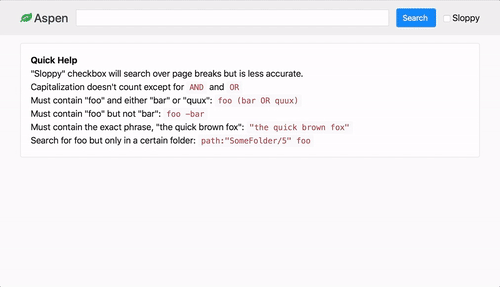https://github.com/statico/aspen
🔎 📖 ✨ Custom, private search engine for text documents built with NextJS/React/ES6/ES7
https://github.com/statico/aspen
corpus docker elasticsearch es6 es7 javascript nextjs plaintext plaintext-documents search search-engine
Last synced: 3 months ago
JSON representation
🔎 📖 ✨ Custom, private search engine for text documents built with NextJS/React/ES6/ES7
- Host: GitHub
- URL: https://github.com/statico/aspen
- Owner: statico
- License: mit
- Created: 2014-08-11T15:57:02.000Z (almost 11 years ago)
- Default Branch: main
- Last Pushed: 2025-03-20T23:58:40.000Z (4 months ago)
- Last Synced: 2025-04-18T01:47:32.905Z (3 months ago)
- Topics: corpus, docker, elasticsearch, es6, es7, javascript, nextjs, plaintext, plaintext-documents, search, search-engine
- Language: JavaScript
- Homepage:
- Size: 1.78 MB
- Stars: 31
- Watchers: 5
- Forks: 5
- Open Issues: 1
-
Metadata Files:
- Readme: README.md
- License: LICENSE
Awesome Lists containing this project
README
# Aspen
Aspen lets you search a large corpus of plain text files via the browser.
[](https://github.com/statico/aspen/blob/master/LICENSE)
[](https://github.com/statico/aspen/actions/workflows/build.yml)
[](https://imgur.com/30X4t9A)
- Powerful search query support through [Elasticsearch query string syntax](https://www.elastic.co/guide/en/elasticsearch/reference/1.7/query-dsl-query-string-query.html#query-string-syntax)
- Performs some basic cleanup of plaintext data and can extract document titles
- Responsive UI that works on mobile
- Runs in [Docker](https://ghcr.io/statico/aspen)
## Getting Started using Docker Compose
### 1. Collect your documents
Put all your files in one place, like `~/ebooks/`:
```
$ tree ~/ebooks
/Users/ian/ebooks
└── Project\ Gutenberg/
├── Beowulf.txt
├── Dracula.txt
├── Frankenstein.txt
```
### 2. Run Aspen & Elasticsearch
```
$ docker-compose up -d
Creating network "aspen_default" with the default driver
Creating elasticsearch ... done
Creating aspen ... done
```
### 3. Convert any non-plaintext (PDFs, MS Word) documents to plaintext
Use the included `convert` utility, which wraps [Apache Tika](https://tika.apache.org), to convert them to plaintext. Pass it a filename relative to your data directory:
```
$ ls ~/ebooks
Project Gutenberg Test.docx
$ docker-compose run aspen convert Test.docx
Starting elasticsearch ... done
Test.docx doesn't exist, trying /data/Test.docx
Creating /data/Test.txt...
...
OK
$ ls ~/ebooks
Project Gutenberg Test.docx Test.txt
```
#### 4. Import content into Elasticsearch
Start by resetting Elasticsearch to make sure everything is working:
```
$ docker-compose run aspen es-reset
Starting elasticsearch ... done
Results from DELETE: { acknowledged: true }
✓ Done.
```
Now import all `.txt` documents. The `import` script will try to figure out the title of the document automatically:
```
$ docker-compose run aspen import
Starting elasticsearch ... done
→ Base directory is /app/public/data
▲ Ignoring non-text path: Test.docx
→ Test.txt → Test Document
→ Project Gutenberg/Beowulf.txt → The Project Gutenberg EBook of Beowulf
→ Project Gutenberg/Dracula.txt → The Project Gutenberg EBook of Dracula, by Bram Stoker
→ Project Gutenberg/Frankenstein.txt → Project Gutenberg's Frankenstein, by Mary Wollstonecraft (Godwin) Shelley
✓ Done!
```
You can also run `import` with a directory or file name relative to the data directory. For example, `import Project\ Gutenberg` or `import Project\ Gutenberg\Dracula.txt`.
**Sometimes plaintext documents act strangely.** Maybe `bin/import` can't extract a title or maybe the search highlights are off. The file might have the wrong line endings or one of those annoying [UTF-8 BOM headers](https://stackoverflow.com/questions/2223882/whats-different-between-utf-8-and-utf-8-without-bom). Try running [dos2unix](http://dos2unix.sourceforge.net/) on your text files to fix them.
#### 5. Done!
Go to http://localhost:3000/ and start searching!
## Development Setup
#### 1. Install dependencies
It's easiest to use Elasticsearch via [Docker](https://www.docker.com/).
You can get Node and Yarn via [Homebrew](https://brew.sh/) on Mac, or you can download [Node.js v8.5 or later](https://nodejs.org/en/download/) and `npm install -g yarn` to get Yarn.
For document conversation (`bin/convert`) you'll want:
1. [OCRmyPDF](https://github.com/ocrmypdf/OCRmyPDF) - for turning image-only PDFs into PDFs with embedded text
1. [Apache Tika](https://tika.apache.org/) - for converting most documents into text, like PDFs with embedded text
1. [UnRTF](https://www.gnu.org/software/unrtf/) - better at converting RTF than Tika
1. [Par](http://www.nicemice.net/par/) - for formatting plaintext documents
On macOS you can `brew install node tika unrtf par`.
#### 2. Clone the repo
```
$ git clone [email protected]:statico/aspen.git
$ cd aspen
$ yarn install
```
#### 3. Set up Elasticsearch and import your data
See steps 1-4 in the above "Using Docker" section. In short, get your text files together in one place, set up Elasticsearch, and import them with the `bin/import` command.
#### 4. Start the web app
Aspen is built using [Next.js](https://github.com/zeit/next.js/), which is Node + ES6 + Express + React + hot reloading + lots more. Simply run:
```
$ yarn run dev
```
...and go to http://localhost:3000
If you are working on `server.js` and want automatic server restarting, do:
```
$ yarn global add nodemon
$ nodemon -w server.js -w lib -x yarn -- run dev
```
## Development Notes
- This started as an Angular 1 + CoffeeScript example. I recently migrated it to use Next.js, ES6 and React. You can view a full diff [here](https://github.com/statico/aspen/compare/4af174d...next).
- I'm still using Elasticsearch 1.7 because I haven't bothered to learn the newer versions.
## Links
- [Elasticsearch Guide](http://www.elasticsearch.org/guide/)
- [Elasticsearch 1.7 Reference](https://www.elastic.co/guide/en/elasticsearch/reference/1.7/index.html)
- [`tree` command](https://www.geeksforgeeks.org/tree-command-unixlinux/)